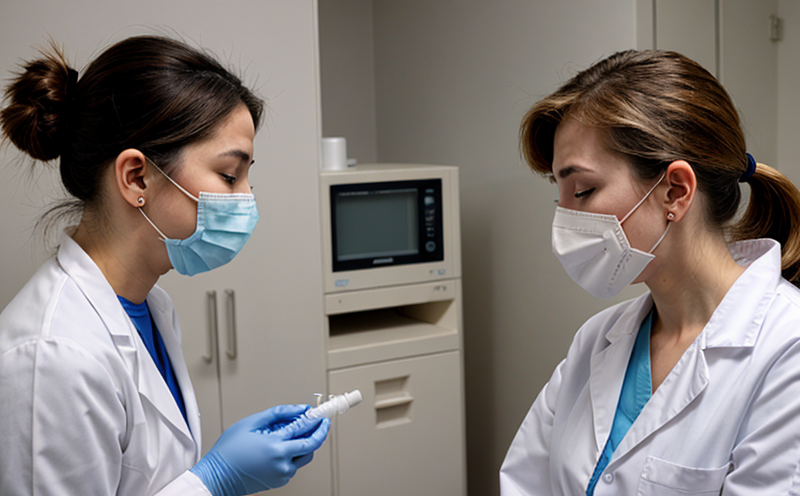Parasite Allergen Detection Testing in Veterinary Diagnostics
The detection of parasite allergens plays a crucial role in the diagnosis and management of allergic reactions in veterinary medicine. Parasites, such as Toxocara canis, Ancylostoma braziliense, and Strongyloides venezuelensis, are common causes of parasitic infections that can lead to severe allergic responses. Accurate detection of these allergens is essential for early diagnosis, effective treatment planning, and the prevention of adverse outcomes.
The process involves the identification of specific parasite antigens in patient samples using advanced immunological techniques. This testing helps veterinarians differentiate between allergic reactions caused by parasitic infections and other conditions like atopic dermatitis or food allergies. By providing precise data on allergen presence and concentration, this service aids in tailoring therapeutic regimens to individual patients.
Parasite allergen detection is particularly important for pets living in areas with high infection rates or those that are immunocompromised. The test can also help monitor the efficacy of treatments and predict potential exacerbations. This service supports a comprehensive approach to pet health management, ensuring that both the primary condition and secondary complications are addressed promptly.
Using standardized protocols based on international guidelines (ISO 15195:2016), this testing ensures reliability and consistency in results across different laboratories. The methodology typically includes sample collection from affected animals, extraction of allergenic components, and detection via enzyme-linked immunosorbent assays (ELISAs) or multiplex immunoassays.
The accuracy and specificity of these tests are critical for accurate diagnosis and treatment planning. This service not only aids in identifying the presence of parasitic infections but also helps in assessing the risk factors associated with allergic reactions, thereby enabling a more proactive approach to pet care.
- Reduces diagnostic uncertainties
- Supports personalized medicine approaches
- Facilitates timely interventions for allergic symptoms
- Promotes early detection and treatment of parasitic infections
In summary, parasite allergen detection testing is a vital tool in the arsenal of modern veterinary diagnostics. By providing accurate and reliable information about allergenic components, this service enhances patient care and contributes to better overall pet health outcomes.
Scope and Methodology
The scope of our Parasite Allergen Detection Testing in Veterinary Diagnostics encompasses the identification and quantification of specific parasite antigens that are responsible for allergic reactions. This testing is particularly useful for diagnosing conditions like Toxocariasis, Strongyloidiasis, and Ancylostomiasis. The methodology involves several key steps to ensure accurate results:
- Sample Collection: Veterinarians collect blood or serum samples from affected animals. Proper collection techniques are crucial for preserving the integrity of the antigens.
- Antigen Extraction: Extracted antigens undergo purification processes to remove impurities and contaminants, ensuring a high-quality sample for analysis.
- Detection Techniques: Advanced immunological methods like ELISAs or multiplex immunoassays are employed to detect the presence of allergenic components. These techniques provide quantitative data on antigen levels in patient samples.
- Data Analysis and Reporting: Results from these tests are interpreted by our expert team, who then generate detailed reports outlining the findings and their implications for treatment.
The use of standardized protocols based on international standards (ISO 15195:2016) ensures that all testing processes adhere to stringent quality control measures. This approach guarantees consistent and reliable results across different laboratories, enhancing the accuracy of diagnoses and the effectiveness of treatments.
Our service covers a wide range of conditions associated with allergic reactions due to parasitic infections. By providing precise data on allergen presence and concentration, we support veterinarians in making informed decisions regarding patient care. This testing is particularly beneficial for pets living in areas with high infection rates or those that are immunocompromised.
Eurolab Advantages
At Eurolab, we pride ourselves on delivering exceptional quality and reliability in our Parasite Allergen Detection Testing service. Our advantages include:
- ISO 15195:2016 Compliance: We adhere strictly to international standards for accurate and reliable results.
- Expertise and Experience: Our team of highly skilled professionals ensures precise and consistent testing outcomes.
- State-of-the-Art Technology: Utilizing the latest immunological techniques, we provide accurate data on allergen levels in patient samples.
- Detailed Reporting: Comprehensive reports are generated for each test to facilitate informed decision-making by veterinarians.
- Patient Safety: Our testing methods minimize any risks associated with sample handling and analysis.
- Clinical Relevance: The results of our tests directly inform treatment strategies, enhancing patient outcomes.
Our commitment to excellence in every aspect of laboratory testing ensures that pets receive the best possible care. By choosing Eurolab for your Parasite Allergen Detection Testing needs, you can be confident in the quality and reliability of the results.
Why Choose This Test
- Accurate Diagnosis: Reliable identification of parasite allergens helps in diagnosing allergic reactions effectively.
- Precision in Treatment Planning: Quantitative data on allergen levels aids in tailoring therapeutic regimens specifically for individual patients.
- Early Detection: Prompt diagnosis and treatment can prevent severe complications associated with parasitic infections.
- Proactive Care: This testing supports a proactive approach to pet health management, ensuring early intervention when necessary.
- Patient Safety: Minimizes risks by providing precise data that guides safe and effective treatments.
- International Standards: Adherence to ISO 15195:2016 ensures consistent quality across different laboratories.
The accuracy and reliability of our Parasite Allergen Detection Testing service make it an indispensable tool for veterinarians. By choosing this test, you ensure that your pets receive the best possible care, supported by precise and reliable diagnostic data.





